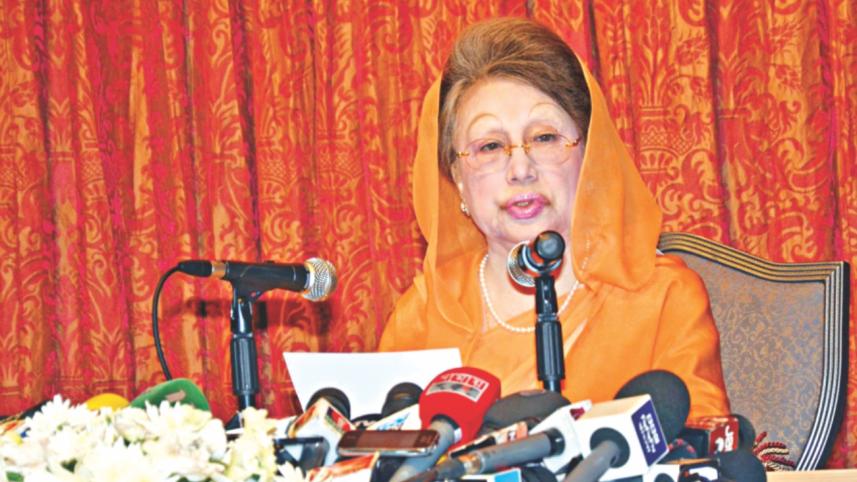Magistracy for Armed Forces: An outrageous proposal

Khaleda Zia's proposal for deployment of armed forces with magisterial power in parliamentary election duty is outrageous.
If they are given the judicial clout, members of the army, navy, and air force will try people on charges of creating disturbances in the elections.
It is the magistrates who hold judicial powers. They have been given this task and they have exercised this power in previous elections.
On the other hand, the armed forces tried offenders by setting up martial law tribunals during the previous martial law regimes led by Gen Ziaur Rahman and Gen Ershad.
Khaleda's proposal has drawn criticism, and rightfully so.
Jurist Shahdeen Malik yesterday termed the proposal absurd.
"Armed forces members are trained to defend the country from external aggression. It's not their job to hold trial of electoral offences by exercising judicial powers," he told The Daily Star.
Jurist barrister Rafiq-ul-Huq also reacted sharply to the proposal. "I want Election Commission should be strong and there should be election, not martial law," he said in an interview with the daily Prothom Alo.
Earlier, armed forces were given the power like a police officer on election day only to arrest an offender without warrant. They exercised the powers in the elections in 2001 and 2008.
But that power was on a limited scale. When engaged in election duties, they were empowered to arrest anybody without warrant within a 400-yard radius of a polling centre for violating electoral laws on only the election day.
The armed forces however lost the authority following an amendment to the electoral laws by the Awami League-led government in 2009.
In her proposal, Khaleda not only sought restoration of the authority for the armed forces but also proposed giving the armed forces unprecedented powers.
Her proposal says: "During National Election, the Election Commission will arrange to deploy Defense Forces with magisterial power, especially, at the polling centers and other strategic places. This deployment will come into force 7 (seven) days ahead of Election Day till gazette notification of the election results."
Khaleda's proposal is however not unprecedented. Her BNP in 2013 came up with the same proposal. In a letter to the EC on March 20, 2013, the BNP sought deployment of armed forces alongside other law enforcement agencies with "necessary magistracy power" to maintain law and order during the polls. It had proposed to the EC to bring changes in the Representation of the People Order (RPO) in this regard.
Past records shows Khaleda did not come up with the proposal all of a sudden nor was it made mistakenly.
Some of her proposals however deserve attention. In one of the proposals, she spoke about the qualification and disqualification of the Chief Election Commissioner and other election commissioners. This is a good proposal though she did not speak for enactment of laws to this effect.
Currently, there are no specific criteria for qualification and disqualification of the commissioners. No law was made in the last four decades or more in line with the constitutional provision to specify procedures and qualification and disqualification of people willing to get appointment as CEC or election commissioners.
All the successive governments took advantage of it by appointing people to these positions to suit their needs. In other words, they chose the persons who would serve their purpose best in the election. This should be stopped for the sake of strengthening the EC.
Khaleda also proposed enlisting all Bangladeshi expatriates in the voter list and make sure they could vote in the parliamentary elections.
The BNP chief proposed an independent secretariat with financial autonomy for the EC similar to the one of the Jatiya Sangsad.
All the important ministries must act in line with the requirements of the EC during the election, said one of her proposals.
The EC will have full jurisdiction over transfer of field level officials ranging from divisional commissioners to upazila nirbahi officers in civil administration and divisional inspector general of police to officers in charge in the police stations, said another proposal.
Now Khaleda's controversial proposal to give magisterial power to the defence forces has sparked a controversy that might sideline her other proposals for electoral reforms. Moreover, bringing the armed forces in the political debate is neither desirable nor healthy.




 For all latest news, follow The Daily Star's Google News channel.
For all latest news, follow The Daily Star's Google News channel.
Comments